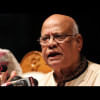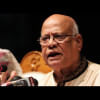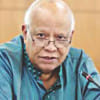Fight militancy with stronger prosecution
An anti-money laundering taskforce will ask the government to introduce a permanent attorney service engaging competent lawyers to fight militancy.
The taskforce under the finance ministry made the decision at a meeting chaired by Finance Minister AMA Muhith at the secretariat yesterday.
The 16-member body -- the National Coordination Committee on Anti-Money Laundering and Combating the Financing of Terrorism -- is tasked with overseeing the government's initiatives to prevent terror financing and money laundering.
Concerns were raised over the release of a number of militant suspects on bail in recent times “due to weaknesses of the prosecution”, several officials who attended the meeting told The Daily Star.
When a suspected militant gets bail, it's the prosecutors' duty to inform the Attorney General's Office about it, but they don't do it in most cases, a number of officials said at the meeting.
Talking to this newspaper, one of the officials said the ministries concerned would sit and discuss how to introduce the service in the country.
“Many issues are involved here. It needs to get the nod from the highest echelon of government,” added the official.
In its mutual evaluation report last year, the Asia/Pacific Group on Money Laundering, a global body, suggested introducing the attorney service in Bangladesh.
Emerging from the meeting, Muhith said, "We have success stories to tell in terms of controlling money laundering and terror financing."
The taskforce members include the principal secretary to the PMO, inspector general of police, the chairman of the Anti-Corruption Commission and secretaries to public safety department of the home ministry.
In 2008, the then caretaker government promulgated the Attorney Service Ordinance, which later ceased to have effect.
Taking office in 2009, the Awami League-led government didn't take any initiative to introduce the service.
Several officials who attended yesterday's meeting said that once the attorney service is introduced, lawyers would be recruited for lower courts through a test such as Bangladesh Civil Service examination.
The attorneys would have a better pay. They would be accountable to the Attorney General's Office and would inform it about the updates and progress in militancy-related cases, they said.
The existing prosecution system in the country is still highly politicised, as successive governments show little will to strengthen the prosecution system with professional lawyers for the important job, according to legal experts.
In case of a crime, it's the state's responsibility to punish the offender. And that largely depends on the performance of public prosecutors who represent the state in lower courts, they say.
The drawbacks in the prosecution system have resurfaced following media reports that a few hundred suspected militants secured bail in the last few years.
Around 150 suspected militants got bail over the last six months. Cases were filed against them under the anti-terrorism act with different police stations in the capital, Savar and Ashulia, according to media reports.
There have been fears that many of them may again get involved in militant activities.
Now, there are 4,000 public prosecutors, additional and assistant prosecutors and government pleaders, who pursue cases across the country on behalf of the state, according to law ministry sources.
The remuneration for the jobs is poor which appears to be an obstacle to recruiting skilled lawyers.
A prosecutor, additional prosecutor or special prosecutor gets only Tk 500 for representing the government in a case. Even if he represents the state in 10 cases in a single day, he would still get Tk 500, say prosecutors.
At yesterday's meeting, the taskforce also decided to ask the government to set up special courts across the country for quick disposal of money laundering cases.
Many such cases remain pending for years as courts have to deal with a huge number of cases.
The taskforce also proposed including a section in the Money Laundering Prevention Act to devise a mechanism for asset management in cases of money laundering and loan scams.
For example, the owners of the Hallmark Group were sent to jail and operation of the company was shut down following the filing of loan scam cases against them.
Under the new mechanism, instead of closing the company's operation, the government would appoint an administrator to run it and manage its assets for ensuring that the bank gets back its money.
The meeting also decided to establish another focal point for better coordination of the money laundering cases and issues. Now, there are two focal points -- the home ministry and the Attorney General's Office.
There have been some problems in coordination of such cases, said several officials who were present there.
Bangladesh Bank Governor Fazle Kabir, Finance Secretary Hedayet Ullah Al Mamun, Banking Secretary Md Eunusur Rahman, Additional Attorney General Murad Reza, ACC Commissioner Nasiruddin Ahmed, and high officials of different ministries attended the meeting.


 For all latest news, follow The Daily Star's Google News channel.
For all latest news, follow The Daily Star's Google News channel. 








Comments